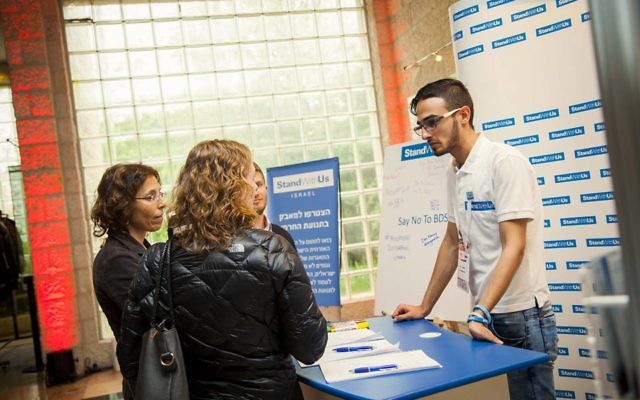Israeli Arab Rejects Boycotts, Violence
Yahya Mahamed works with StandWithUs to promote pro-Israel advocacy on college campuses.

In 2014, Israeli Yahya Mahamed posted something on Facebook that changed his life: a photo showing him holding an Israeli flag with the hashtag “BringBackOurBoys” under it.
The boys were three young Jews who were abducted in the West Bank, presumably by Hamas, and killed in an incident that provoked that summer’s Gaza war.
“No one was condemning this kidnapping, so I decided I had to,” said Mahamed, who, like two of the abducted Jews, was a teenager. The difference was that Mahamed is Muslim and comes from Umm al-Fahm, the third-largest Arab city in Israel.
His condemnation wasn’t well received.
Within hours of his post, he had 400 notifications and some threats. People in his hometown called him a traitor and a spy. Some talked about killing him. He got a phone call from an unknown person telling him to go to the police for his own protection.
Soon, friends and family stopped talking with him.
But Mahamed hasn’t stopped talking. In fact, he spends most days doing just that for the Jerusalem office of nongovernmental organization StandWithUs. As part of his visit to the Atlanta area in late October, he spoke Monday, Oct. 30, to a standing-room-only crowd at the University of Georgia, brought to campus by Dawgs for Israel and StandWithUs.
Unlike some StandWithUs events featuring Israeli soldiers at the university, Mahamed’s appearance was not disrupted by pro-Palestinian activists.
His message? As an Israeli Arab, he wants people to know that Israel is not the apartheid-promoting, Arab-hating nightmare often portrayed in the media.
In school in his hometown, Mahamed studied to be a mechanic, following a course taken by other high-schoolers in Israel who subsequently join the Israel Defense Forces — but as an Arab, he didn’t join the army.
With no work in his town, he found a job as a busboy in a Tel Aviv hotel, where his Jewish co-workers accepted and helped him.
During his first workweek, just before Sukkot, he met a Chabadnik, who asked him whether he had put on tefillin that morning. Mahamed told him he wasn’t Jewish, and he responded, “It doesn’t matter if you’re Jewish. What matters is if you’re a good person.”
The response startled him, Mahamed said.
His experience with his hotel co-workers and that chance encounter made Mahamed start to rethink his life and everything he had been taught about Israelis: the messages in school that taught children to hate Israel; the nonstop videos of Israeli soldiers supposedly brutalizing Palestinians; the swastikas and Islamic State logos around town; the way members of the Islamist movement seemed to prosper while others in Umm al-Fahm did not; a mosque dedicated to Islamic State.
Mahamed came to believe he had received misinformation, not an education.
After volunteering with StandWithUs, he became an educator with the Israel advocacy organization in 2016, doing outreach in Arabic and stressing that “violence gets people nowhere.”
He has called himself a Muslim Zionist and has taken his message around the world. In October, he toured Canada on behalf of StandWithUs, speaking to receptive audiences in Toronto, Montreal, Vancouver and Winnipeg, before visiting Georgia and other states.
In Athens, Mahamed showed photos of a trip he took with a delegation to Johannesburg to help Jewish students during Israeli Apartheid Week. When protesters couldn’t shout him down, they cut the cord to his microphone.
He talked with two Muslim students and assured them he’s not suffering in Israel. An Egyptian woman told him his head belongs on a pike. But he believes that the students were receptive to the StandWithUs message.
Since he joined the advocacy organization, Mahamed said, the social pressure targeting him has expanded to his family. His neighbor’s house was bombed — the wrong house was targeted — and threats are constant.
For his own safety, he has moved to Jerusalem.
He told the UGA students that boycotting Israeli products and companies can hurt Palestinians. A factory in the West Bank where most of the employees were Arabs faced pressure from the boycott, divestment and sanctions movement and decided to move into Israel, ending jobs for more than 400 people. So whom did the calls for boycotts hurt?
Mahamed ended his talk by encouraging the students to educate others and to talk with them about Israel.



comments